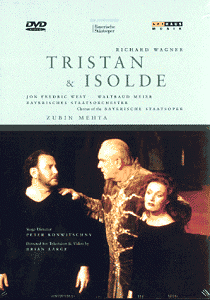Richard WAGNER
Tristan und Isolde
 Tristan: Jon Fredric West,
ten. Tristan: Jon Fredric West,
ten.
Isolde: Waltraud Meier, sop.
Brangäne: Mariana Lipovsek, ms.
King Marke: Kurt Moll, bass
Kurwenal: Bernd Weikl, bar.
Melot: Claes H. Ahnsio, bar.
Bavarian State Opera Orchestra and Chorus
Conductor: Zubin Mehta
Stage Director: Peter Konwitschny
Stage and Costume Design: Johannes Leiacker
 ARTHAUS 100 056 ARTHAUS 100 056
 (2 DVDs) [241.00]. (2 DVDs) [241.00]. |
 |
| Crotchet
AmazonUK
AmazonUS
Amazon
recommendations |
While the major labels dither and hesitate about converting their many videos
to DVD format, one new label, Arthaus, is making a major place for themselves
on store shelves. They have issued a flood of new releases, mostly of recent
performances of the opera repertory. This Tristan und Isolde was recorded
from the 1998 Munich Opera Festival and, while the Birgit Nilssons and von
Karajans for the time being must wait in the wings, this performance moves
to the front ranking of those currently available on DVD. Featuring a fine
cast and a remarkable stage production, it is a valuable record of an important
performance.
It is blessed with the two lovers sung by about the best voices available
on opera stages today. Waltraud Meier makes a major impression as a lithe
and attractive Isolde. Perhaps the most attractive woman ever to sing this
Wagnerian heroine, she is an important asset for a visual representation
such as this. She has a firm grasp on the role and its difficulties and delivers
the vocal lines with power and passion. She became famous singing mezzo roles
but occasionally takes on the soprano repertory and was a splendid and sexy
Kundry in the video of the Metropolitan Opera's Parsifal from 1993.
A superb singing actress, she shows no signs that the range of this role
was difficult or uncomfortable for her. Her 'Liebestod' was delivered to
a single camera, close up, and was a daring and impressive visual and vocal
accomplishment.
The contributions of the Tristan, Jon Fredric West, a native of the American
mid-West, were a bit less effective but significant nevertheless. He is one
of the few tenors brave enough to take on this notoriously voice-taxing role.
Even the amply gifted Ben Heppner has not indicated that he will sing Tristan
again. Possessing a strong - if a bit dry sounding - tenor voice, West is
certainly in the Heldentenor class and makes a major impression. Sometimes,
during those many orchestration-rich moments in this music, he showed signs
of strain and can be heard resorting to that time-honored tradition of the
Wagnerian bark. But there are many moments where he sings with power and
commitment and his long Third Act almost-monologue showed a fine talent for
acting and vocal characterization. The one irritating habit of his was to
keep his eyes firmly fixed on the conductor and, during the love scene close-ups,
this was most apparent. His Isolde was not similarly encumbered and somehow
always managed to be on the beat.
The Kurwenal of Bernd Weikl is a record of his unfortunate current vocal
decline, with strain and off-pitch delivery the distressing features of his
role. The grand bass, Kurt Moll, 4 years older than Weikl, sings with the
force and feeling of a much younger man and brings such abilities to the
role of King Marke that his scenes are filled with intense emotion. Marjana
Lipovsek was a sturdy Brangäne and Claes Ahnsjo was an appropriately
evil Melot. Zubin Mehta, Music Director of the Bavarian State Opera, conducted
his forces with sensitivity and force. While not destined to be one of the
great Wagnerians, he has slowed and broadened his conducting style in his
later years and this allows this music the necessary breathing space in which
to flower.
Peter Konwitschny, an aging 'enfant terrible' of the European opera stages,
has irritated audiences, and this writer, more than once with his concept
productions. This, however, is one of his most successful works and it is
a clear and powerful dramatization of this story. Starting the tale on the
fantail of a post-modern designed ship, the staging and direction is innovative
and invariably visually compelling. Ideas are fresh but always relate to
the music drama and this works well in this new media. It has a 16:9 screen
format and subtitles available in French, German, English and Dutch. With
interesting visual treatment and much fine singing, it is recommended.
Frank Cadenhead

